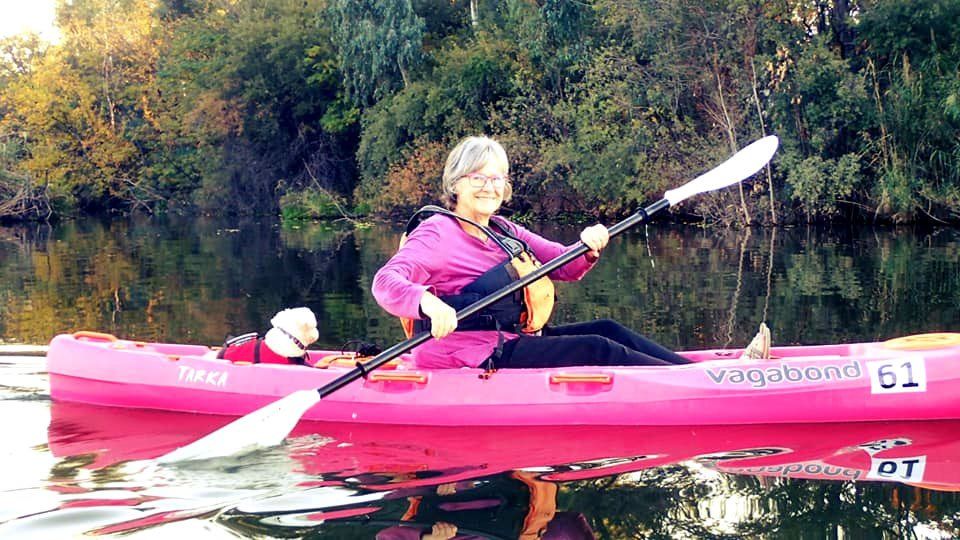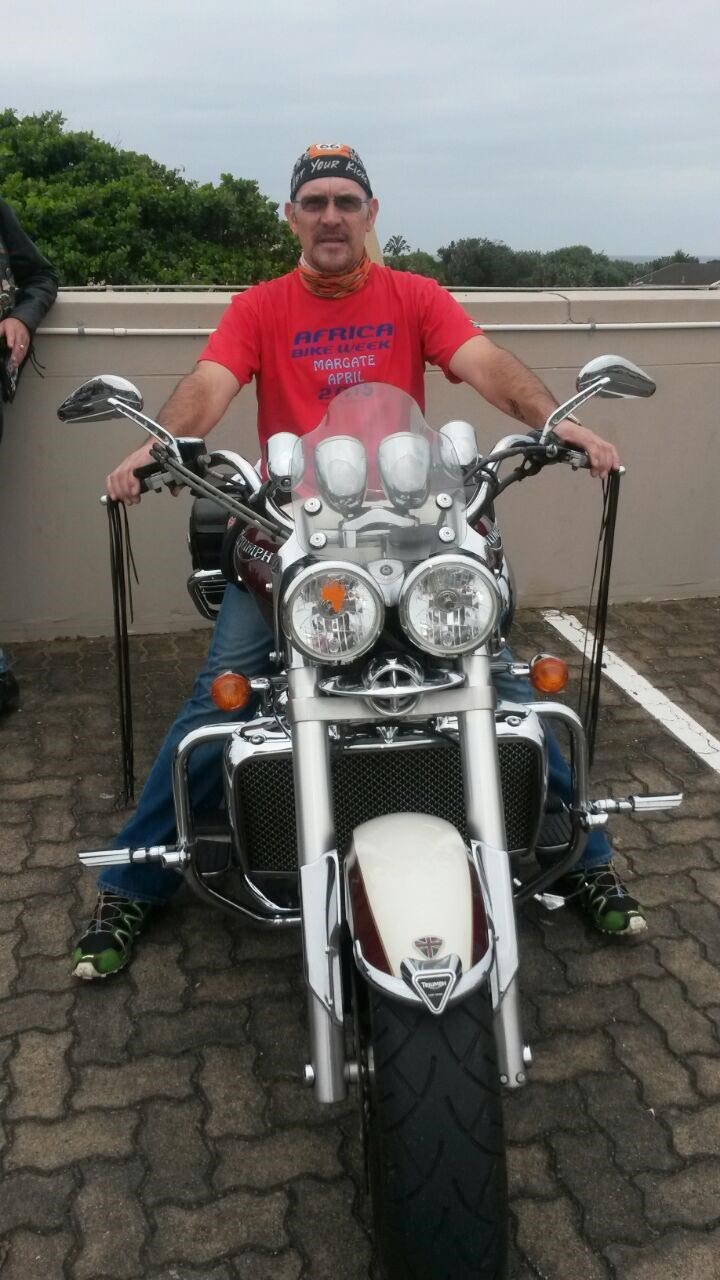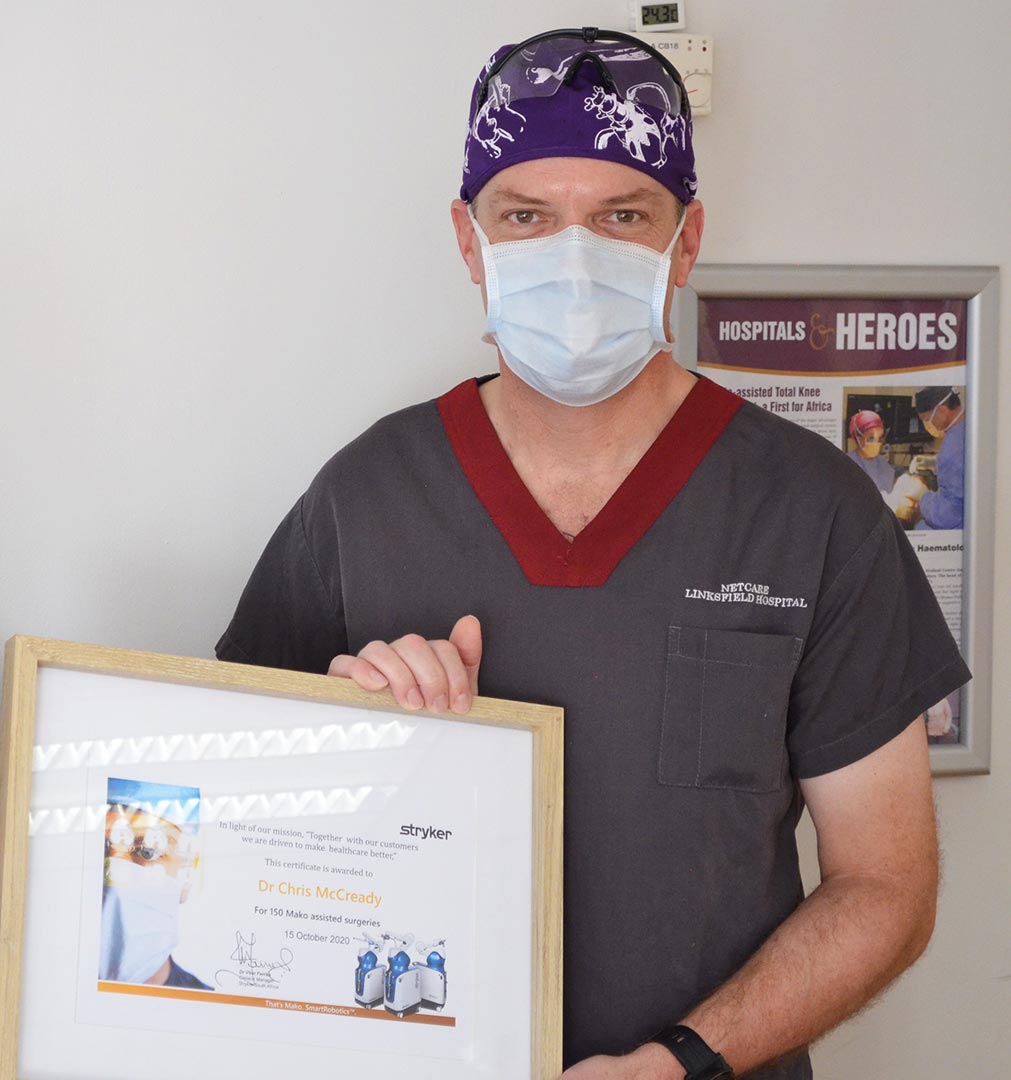The Johannesburg hospital where Africa’s first robotic-arm assisted total knee replacement surgery was performed a little over a year ago, recently reached a milestone 150 life-changing hip and knee replacements using this advanced precision technology.
“In a short space of time this technology has already been used to help more than 150 persons regain their mobility through full and partial knee and hip replacements at our hospital,” says Dr Louis van der Hoven, general manager of Netcare Linksfield Hospital. “We congratulate orthopaedic surgeon, Dr Chris McCready on this achievement, which is certainly cause for celebration, particularly for all those individuals who can now enjoy better mobility and quality of life after their operations.”
Dr McCready underwent special training in Amsterdam in the Netherlands to become accredited to perform surgery using the Mako robotic-arm surgical system. Dr McCready’s first 150 Mako procedures comprised 39 partial knee replacements, 53 total knee replacements – including the first such procedure on the African continent – and 58 total hip replacements.
“During surgery, the robotic-arm system offers greater accuracy as it provides detailed visual, auditory and tactile feedback to the surgeon, which helps prevent damage to critical structures within the joints,” Dr McCready explains.
“The Mako robotic-arm system is controlled by the surgeon at all times, however the surgical work is restricted within pre-defined areas of the bony anatomy, allowing for ideal placement of the prosthetic joint while also protecting soft tissues during surgery, which can reduce recovery times and post-operative pain,” he says.
“We are focused on achieving the best outcome for each patient, and have been collating data from the patient’s surgeries, which so far appear to reflect these advantages. It is most rewarding to hear the first-hand accounts of how people’s lives have changed after their hip or knee replacement, and encouraging that most have reported rapid recovery and little, if any, pain.”
Patients’ experiences
One of the patients who benefitted from the hip replacement procedure recently is 68-year-old Mrs Elizabeth D'Oger de Speville, whose arthritis in her right hip had become gradually more painful. After nine months of finding it more and more difficult to walk, she travelled from her home in Parys to consult Dr McCready.
“Some 15 years ago I had my other hip replaced, and the recovery took quite a long time. Even though that hip replacement was life-changing in itself, I was a little reluctant to have this second hip replacement, but had reached the point where my hip was holding me back from doing the things I love,” she says.
She was therefore intrigued to hear of the Mako robotic-arm assisted surgery, which is associated with shorter post-operative recovery time. “Dr McCready operated on my ankle two years ago after I injured it while hiking in Morocco, and so he knows that I am a very active person who finds it particularly hard not to be mobile.”
At the end of August this year, Mrs D’Oger de Speville underwent a full replacement of her right hip, which Dr McCready performed using the robotic-arm surgical system, and went directly home after spending two nights in hospital. In addition to the hip replacement, Dr McCready was at the same time able to reduce a small difference in the length of her legs using the Mako robotic-arm surgical system, which enables more accurate correction of irregularities such as leg length discrepancies.
Dr McCready also recently performed a partial knee replacement using the robotic technology for Mr Frederik Scheffer, who some 25 years ago sustained a basketball injury to his knee requiring the removal of cartilage.
“Last winter was extremely cold and my knee became very painful. Other orthopaedic surgeons I had consulted proposed a full knee replacement, however on a friend’s recommendation I sought the advice of Dr McCready, whom I previously saw interviewed on TV about the Mako surgery,” Mr Scheffer says.
“I think the technology is fantastic, and after five weeks I am almost fully mobile again. There was no pain after the procedure, although there was discomfort and swelling, and now I am feeling better each day. I can walk on both legs and I’ve already returned to gym with the physiotherapist’s guidance.”
Mrs D’Oger de Speville adds that compared to her previous hip replacement 15 years ago, it is amazing how techniques have improved. “I have been pleasantly surprised how rapid my recovery has been so far. Only eight weeks after my hip replacement, I am walking for short distances without needing a crutch, and I go for longer walks every morning and evening. I haven’t had pain, although it was a bit uncomfortable at times, and I only used painkillers for a few days after the procedure,” she says.
From her experience, Mrs D’Oger de Speville says her recovery from the robotic arm assisted procedure has been considerably quicker, complemented by the fact that she has been diligently working on her physiotherapy. “I think the robot knows exactly where the implant should be placed, and it felt less intrusive perhaps because it is so precise.”
“More mountains to climb” and advice to others
“It is not only that the hip itself deteriorates, but the biomechanics of your body are thrown out because you can’t walk normally. Before the operation, I started to feel that my back, my knees, and my other hip were taking strain, and it felt like this additional pressure was causing extra unnecessary ‘wear and tear’ to my muscles and other joints,” Mrs D’Ogers de Speville says.
Mr Scheffer experienced similar problems prior to his operation. “The body tries to adjust by shifting your weight to reduce the pain and as a result you walk differently, impacting the other knee, your hips and back. The operation has certainly been worthwhile – nothing short of life-changing - and I look forward to riding motorbikes again once I am fully recovered.”
Asked what advice she would share with other people who may require a hip replacement but are apprehensive about undergoing the operation, Mrs D’Oger de Speville says “don’t delay, it won’t get any better on its own”.
“I am still young at 68, but the arthritis in my hip was causing me to limp and that is what made me feel like an old woman. I know from the replacement of my other hip at the age of 52 just how remarkable it feels to get back the freedom of full mobility. Since then I have walked a couple of the Camino de Santiago or ‘the Way of St James’ pilgrimage trails in Spain and when I am fully recovered, I intend to go back and do another. I have many more mountains to climb,” she says.
Dr Van der Hoven congratulated Dr McCready on reaching the landmark 150 procedures. “Having brought the benefits of this precision technology to patients, Dr McCready’s expertise with this highly specialised surgical system is an asset to orthopaedic healthcare. This sophisticated surgical option offers people needing either full or partial hip or knee replacements access to world-class treatments that have shown locally to result in quicker recovery times and very satisfied patients.”















